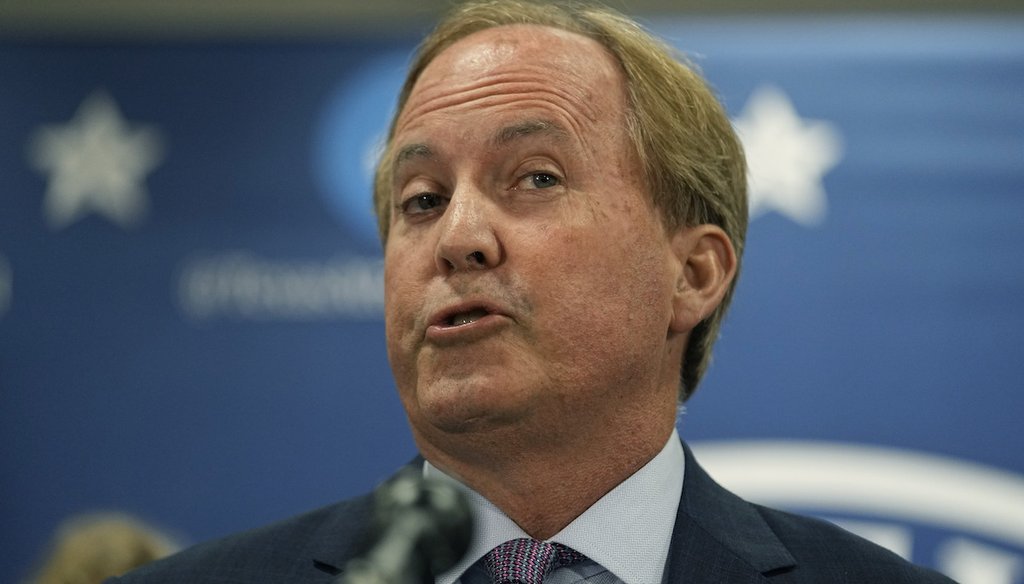Stand up for the facts!
Our only agenda is to publish the truth so you can be an informed participant in democracy.
We need your help.
I would like to contribute

Texas state Attorney General Ken Paxton makes a statement at his office in Austin, Texas, on May 26, 2023. (AP)
Texas Attorney General Ken Paxton is the first statewide elected official impeached in more than 100 years.
On Sept. 5, Paxton faces the Texas Senate for a trial that delves into accusations of various misdeeds that include bribery, abuse of office and obstruction of justice. The tribunal is the result of the Texas House voting 121-23 to impeach Paxton.
The attorney general denies any wrongdoing.
Let’s break down the 20 articles of impeachment against Paxton:
Articles I-V: Misuse and abuse of office
The first five articles of impeachment accuse Paxton of using his power as attorney general to benefit Nate Paul, a campaign donor and real estate businessman. Paul is under federal indictment on charges of making false statements to mortgage lenders and credit unions to secure loans for his businesses.
Paxton is accused of directing his agency’s staff members to intervene in a lawsuit between Paul’s business and an Austin nonprofit. That intervention had the appearance of negotiating on behalf of Paul, arguing for a settlement between his business and the Roy F. and Joann Cole Mitte Foundation, according to the House managers who will prosecute him. Paul is a friend of Paxton’s and donated $25,000 to his campaign in 2018.
Meanwhile, Paxton prepared a nonbinding legal opinion that held off a 2020 foreclosure sale of as many as 13 of Paul’s properties. Paxton’s office had asked state Sen. Bryan Hughes, R-Mineola, to submit a request for a legal opinion that appeared tailor-made for Paul, according to legal filings from House managers. Only government officials can request such opinions, and Paxton quickly issued a directive that shut down the property auction.
The articles allege Paxton used his office to direct the release of law enforcement documents related to the federal investigation of Paul. In Texas, the attorney general’s office issues nonbinding rulings when public requests for government documents are challenged. Paxton sought to turn over FBI documents to Paul provided to the Texas Department of Public Safety that are typically excepted from Texas’ public information laws, according to House managers.
Paxton directed an agency staffer in 2020 to deliver documents to Paul, though it is unclear what was provided, according to allegations in the articles. However, Paul’s attempts to obtain the FBI documents ceased shortly after the employee delivered a manila envelope.
Finally, Paxton is accused of hiring an attorney over the advice of top-ranking agency officials to conduct an investigation into complaints Paul made against law enforcement, including the FBI and the Department of Public Safety, related to the raid and search of his home and business. The attorney, Brandon Cammack, attempted to issue 30 subpoenas but was thwarted after staff at the attorney general’s office intervened.
Article VI-VIII: Disregard of duty and the whistleblowers
Eight top-ranking staff at the attorney general’s office filed complaints against Paxton with the FBI related to the attorney general’s dealings with Paul. In response, Paxton fired several of the whistleblowers. Others resigned, they said.
Four whistleblowers sued, and in February they agreed on a $3.3 million settlement that included a public apology.The Legislature refused to spend the money for the settlement. However, Paxton’s request for the funds touched off the House investigation that led to his impeachment.
Three articles accuse Paxton of disregard of duty and misapplication of public resources related to his treatment of the whistleblowers.
Paxton is accused of having no cause to terminate the whistleblowers, something he has all but admitted in the proposed settlement agreement. The articles allege that Paxton used taxpayer resources to conduct a "sham" investigation into the whistleblowers’ complaints in which his office exonerated him of any wrongdoing. Meanwhile, Paxton withheld information from voters about his alleged wrongdoing by entering into a settlement agreement and avoiding a public trial, according to the articles’ charges.
Articles IX and X: Bribery
Articles IX and X revolve around the alleged benefits Paul provided to Paxton in exchange.
Paxton is accused of arranging Paul to hire the woman alleged to have had an affair with the attorney general. She was identified as Laura Olson by Paxton’s team in legal documents. A woman by the same name had been a staff member with state Sen. Donna Campbell, R-New Braunfels, for several years.
The articles also allege that Paxton accepted remodeling work from Paul on his home in Austin.
Articles XI-XIV: Securities fraud allegations and obstruction
Not long after he was inaugurated in 2015, a Collin County grand jury indicted Paxton on criminal charges that he steered clients toward investing in a McKinney technology company without disclosing that he had received 100,000 shares of its stock. The articles also accused him of funneling clients to a friend’s investment firm without registering with the state.
Paxton has yet to face trial for the allegations in the eight years that followed. His legal team has delayed the trial by challenging the venue. Paxton allies also sued over how much special prosecutors should be paid.
The impeachment articles accused Paxton of obstructing justice by delaying the trial and preventing the public from being able to see the facts of the case. This year, a judge ruled he will face a criminal trial in Harris County. Recently, Paxton’s defense attorney said Paxton might enter into a plea deal if he is removed from office.
The articles reiterate some of those criminal allegations against Paxton. They also accuse him of failing to disclose all of his financial interests in disclosures that elected officials are required to make public.
State senators voted to hold off on trying him on the securities fraud articles and one other article until after they address the remaining allegations.
Article XV: False statements in whistleblower report
This article accuses Paxton of making false or misleading statements in a report his office created related to whistleblower allegations. In that report, Paxton indicated that he committed no crimes and acted consistent with previous attorney generals’ conduct in his dealings with Paul.
Articles XVI-XX: Dereliction and unfitness
The final four articles of impeachment are broad and essentially state that the breadth of allegations against him should disqualify him from office.
They allege he conspired to commit wrongdoing, inappropriately used the authority of the attorney general’s office to benefit others and acted against the public’s interest. They state the allegations render him unfit for office and that his actions have brought shame upon his office.
Our Sources
Sources linked in article.





























